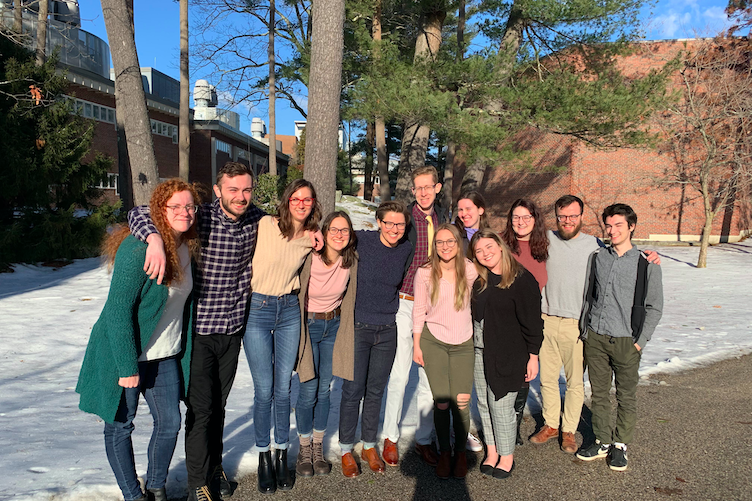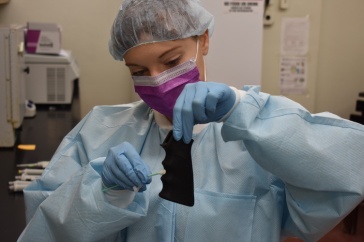
Lauren Flynn (back row, fourth from right) and Catherine McGrath (front row, right) with class members of Caitlin Mills' (fifth from left) course on daydreaming.
A course in the science of daydreaming got Lauren Flynn ’20 thinking about the creativity that can bloom when our minds are free to wander. That led to a research position in the affect, cognition and computation lab of assistant professor of psychology Caitlin Mills, who taught the class. Flynn met Catherine McGrath ’20, another lab researcher, and the first seeds of a joint project for the 2020 Undergraduate Research Conference began to grow.
“I was especially interested in the creativity aspect of the daydreaming class, our debates as to what constitutes ‘creative’ and what kinds of factors influence it, either positively or negatively,” Flynn says. “Catherine was interested in educational psychology. We combined both our interests and decided to look at how boredom influences creativity, hoping to apply our results to create a more ideal classroom setting.”
The pair spent the spring of 2019 “bouncing ideas off each other” before identifying the research questions for “Boring Ideas: Exploring Boredom as an Incubator to Creativity.” That summer, they read up on previous research results and gathered information. Then, during the fall semester, they conducted two experiments that examined how a brief boredom induction (less than 3 minutes) influences creativity when participants have prior exposure to a task. The subjects completed a divergent thinking task (alternate uses task), then watched a brief boring or engaging video before returning to the same divergent thinking task.
“Across both experiments, we found evidence that participants who watched a boring video either generated more unique answers on the divergent thinking task or generated more answers overall compared to participants in an engaging video condition,” McGrath says.
Almost everyone experiences boredom, broadly defined as “the state of being weary and restless through lack of interest.” Yet Flynn and McGrath found evidence that linked boredom with positive outcomes like creativity.
“Across both experiments, we found evidence that participants who watched a boring video either generated more unique answers on the divergent thinking task or generated more answers overall compared to participants in an engaging video condition."
They also looked at whether participants’ freely-moving thoughts (a dimension of mind-wandering) while watching the video related to task performance and found it did not but was predictive of the number of ideas generated.
“Boredom and creativity are two things that seem to be completely opposite, but at the same time everyone can relate to thinking of some unique ideas when they’re bored. That juxtaposition, and the possible implications which point to boredom not being solely negative, are what interested me the most,” says McGrath, a psychology major with a minor in history.
Adds Flynn, a double major in psychology and human development and family studies, “I’ve always enjoyed being creative, and was curious about how to enhance creativity through environmental influences. I wanted to know what conditions were ideal for maximizing my own and others’ creativity.”
The conditions under which the pair presented their research was a first for the conference, which marked 20 years in 2019. This year, because of the coronavirus, all URC participants had to present their research remotely. (All of the projects were prerecorded and can be viewed on the URC site.)
“While it was far from what we expected, and stressful to make an online talk and hear your own voice, I was very glad to have been able to share what we worked very hard on,” McGrath says.
Flynn agrees. “It obviously wasn’t the most ideal way to present our research, but I was also glad to have been able to share our research since we worked so hard over the past year.”
Since it was first launched in 2000, URC has grown from 159 presenters to more than 2,000 students and more than 440 faculty mentors.
-
Written By:
Jody Record ’95 | Communications and Public Affairs | jody.record@unh.edu
















































